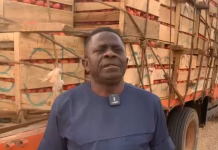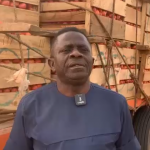Labour consultant Austin Gamey has raised significant concerns regarding the ongoing controversy over four vacant parliamentary seats, describing it as a “burdensome” situation that could severely impact Ghana’s already fragile economy.

The unresolved issue, which has been causing gridlock in Parliament, has been a point of growing tension, and Gamey believes that it could hinder the country’s ability to make critical decisions, thus affecting its economic stability.
Speaking on The KeyPoints with Alfred Ocansey on November 9, Gamey emphasized the urgency of addressing the vacant seats, warning that the prolonged stalemate could further exacerbate the economic challenges the country is currently facing, including high inflation, mounting public debt, and low investor confidence.
“The country already has an existing strangled economy, and this situation is something we should all be worried about,” Gamey stated. He stressed that any further delay in resolving the issue will only undermine efforts to stabilize the country’s economic outlook.
Gamey’s concerns come as Parliament struggles to conduct its business effectively, with the controversy over the vacant seats resulting in disruptions and an inability to achieve quorum in the House.
This, he argued, has led to a lack of progress on crucial bills and reforms, thereby delaying economic recovery efforts.
He further warned that a lack of legislative action could lead to investor uncertainty and may hinder government policies aimed at addressing the economic crisis.
The labour consultant also highlighted the critical role of Parliament in ensuring economic stability and governance, emphasizing the importance of its independence from other branches of government.
“Parliament should not be perceived as an extension of the executive or the judiciary,” he said.
Gamey urged MPs to prioritize national interest over party politics, especially in times of economic distress, and work collaboratively to resolve the impasse.
“Parliament must align its decisions strictly with Ghana’s constitution,” Gamey added, pointing out that while MPs come from political parties, their primary duty is to serve the nation and uphold constitutional integrity.
He also warned against excessive judicial interpretation, which he believes could limit the Supreme Court’s ability to act decisively on constitutional matters.
According to Gamey, certain constitutional provisions should be applied directly to avoid unnecessary delays, particularly on issues as critical as legislative vacancies.
The vacant seats issue has led to a deepening political divide in the country, with some accusing Parliament of failing to uphold its responsibility to the electorate.
Gamey’s remarks serve as a stark reminder of the broader implications of political gridlock, urging lawmakers to act in the best interest of the country’s long-term economic health.
He concluded by calling for swift resolution of the issue to restore legislative normalcy and ensure that Parliament can effectively carry out its constitutional duties, especially in a period of economic crisis.
As the country faces mounting economic pressures, Gamey’s appeal underscores the urgent need for political cooperation and decisive action to prevent further damage to Ghana’s economic future.
























































![[FREE FREE MONEY] Predict and Win a Guaranteed GH¢200 From Us EVERY WEEK](https://wordpress.ghanatalksradio.com/wp-content/uploads/2022/02/Predict-and-Win-Final-09-03-2021-218x150.jpg)
![[Predict & Win – 8th/Oct.] WIN A Guaranteed ¢200 From Us This Week](https://wordpress.ghanatalksradio.com/wp-content/uploads/2021/10/maxresdefault-16-218x150.jpg)
![[Predict & Win – 2nd] WIN A Guaranteed ¢200 From Us This Week](https://wordpress.ghanatalksradio.com/wp-content/uploads/2021/09/maxresdefault-50-218x150.jpg)
![[Predict & Win – 25th] WIN A Guaranteed ¢200 From Us This Week](https://wordpress.ghanatalksradio.com/wp-content/uploads/2021/09/maxresdefault-36-218x150.jpg)
![[Predict & Win – 18th] WIN A Guaranteed ¢200 From Us This Week](https://wordpress.ghanatalksradio.com/wp-content/uploads/2021/09/maxresdefault-23-218x150.jpg)









![[National cathedral] See full list of churches that have contributed since 2018](https://wordpress.ghanatalksradio.com/wp-content/uploads/2020/09/Ghana-National-Cathedral-GhanaTalksRadio-100x70.jpg)



